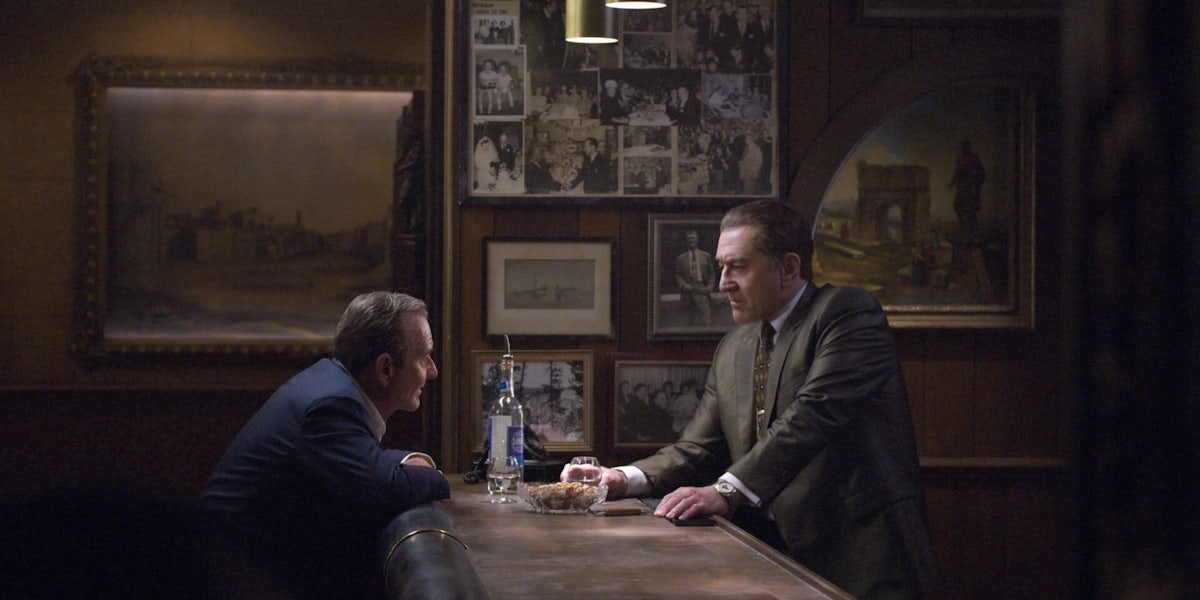There’s a lot riding on The Irishman, Martin Scorsese’s sprawling, nearly three-and-a-half-hour epic that was more than a decade in the making. It’s Scorsese’s first movie with Al Pacino and reunites him with longtime collaborators Robert De Niro and Joe Pesci, who’ve created some of the greatest films of all time together. It has a reported $160-million budget that only Netflix was willing to front, and given Scorsese’s choice to use de-aging technology that made De Niro, Pesci, and Pacino look several decades younger, the visual effects could easily make or break the film.
And those big risks largely pay off in leaps and bounds, it in itself a minor miracle. The Irishman is grounded by strong and captivating performances from its three leads that work best when it’s scaled down to its core: two or three characters in a room having a multilayered conversation. It’s often darkly funny (more than you might expect) and heads into melancholy territory. And with astounding clarity, The Irishman grapples with its own characters’ mortality and legacies even as it gives an up-close look at the humanity in some of those larger-than-life figures before tearing it apart layer by layer.
DIRECTOR: Martin Scorsese
STREAMING: Netflix
An elderly Frank Sheeran reflects on his relationship with Jimmy Hoffa, the union leader who famously went missing (and who Sheeran admitted to murdering late in life).
It’s tempting to compare The Irishman to Scorsese’s other mob movies like Goodfellas or Casino (which both star De Niro and Pesci). And sure, you have some crossover in the genre or the cast, and much of the film is aided by a voiceover from Frank Sheeran (De Niro), the titular Irishman, similar to how Henry Hill’s voiceover leads us through Goodfellas. But while Goodfellas gives us a classic rise-and-fall story, The Irishman is a much slower build in that it doesn’t fit into a simplistic narrative. Its slowness comes not just because of its run time, which does feel a tad long at times but manages to pick back up through a mix of action, its use of suspense, and three veteran actors at the top of their game.
At first, The Irishman tries to juggle several stories at once. Framed by an elderly Frank Sheeran relaying the story of his life, it looks back at Sheeran’s rise in the crime world and a fateful trip decades later. The first part of the film is on the sloppier side, but it eventually finds its groove.
It’s not just in the film cutting from one era to another with little fanfare, leaving you to pay attention to how much younger the core trio looks to figure out when the scene occurs. It’s also getting used to seeing De Niro, Pesci, and Pacino de-aged, particularly when we already know just what they looked like because it was captured in now decades-old movies—especially De Niro. (For what it’s worth, many of those were also directed by Scorsese.)
The de-aging isn’t always seamless, and at times, the façade starts to slip; extreme close-ups don’t always work, and sometimes the weakness might lay in the hairlines. (From a CGI standpoint, the weakest shot is right in the trailer: a 20-something Frank Sheeran wielding a gun during World War II). With some more tweaking, the de-aging technology could be a real game-changer for filmmaking. But, more often than not, the performances and a sharp screenplay from Steven Zaillian keep you from getting lost in the technology for too long. Multiple conversations are happening at once in what might be simplistic scenes, with an early explanation on jargon paying off in spades much later in the film, giving that second conversation a much greater weight.
As Frank Sheeran says at one point, a lot of people nowadays don’t know who union boss Jimmy Hoffa (Pacino) is, or if they heard of him, they only know that he disappeared; a long-standing rumor is that Hoffa was buried under the old Giants Stadium in New Jersey. But what The Irishman and Pacino capture so well is that before his disappearance became the stuff of legend, he was a person with his own set of quirks (he really likes ice cream!) and is easily prone to anger. There’s ruthlessness toward his enemies but also kindness.
Pacino’s performance is the showiest, but The Irishman wouldn’t work without a quiet performance from Pesci or the heart and heartbreak that De Niro brings to it. It’s easy to see all of them getting Oscar nominations (and one for Scorsese as well), each of which would be wholly deserved.
Outside of the main trio, the extensive cast doesn’t fare as well. Ray Romano is particularly entertaining as Russell’s cousin Bill Bufalino, but most of the female characters—wives and daughters of male characters in the film—have very little to do or even much to say. Anna Paquin, who plays Frank Sheeran’s daughter Peggy as an adult, gets to do little more than scowl (with the occasional moment of happiness) and is largely wasted in the role. But for better or worse, it’s Frank Sheeran’s story, so outside his main circle, it probably doesn’t matter as much.
Throughout The Irishman, mortality is hanging over the heads of all its major players, even if most of them won’t meet their ends in a cinematically appealing shootout, an execution, or something as legendary as Hoffa’s disappearance. The reality is far messier and often far more ordinary, but there’s still beauty in the mundane.
The Irishman premiered at the New York Film Festival on Sept. 27.
